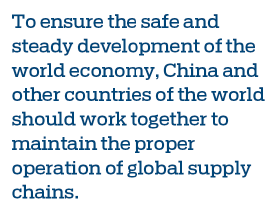Counterweight to anti-globalization
Belt and Road Initiative is an opportunity for China to expand its global supply chains and strengthen their resilience
In recent years, the trend of anti-globalization, along with mounting conservatism, populism, isolationism and anti-elitism, has severely impacted the global supply chain and affected its regular operation. Due to the spread of the novel coronavirus, manufacturing supply chains, commodity demand and tourism have taken big hits. All countries should contain the damage amid the new round of globalization reversed to avoid a depression such as that of the 1930s.
From the aspect of manufacturing supply, some countries' unilateral activities have severely harmed the global supply chains. The withdrawal of participants can affect the production and cooperation between countries involved. It can even rupture industrial supply chains and reduce the production capacity of countries. Given multinational enterprises in developed countries generally occupy a higher position in industry supply chains, their withdrawals will cause huge losses and destroy the integrity of the supply chains to a large extent because cooperative enterprises in the downstream will be unable to find substitutes.
Emerging economies, including China, have been promoting regional integration and multilateralism. China is the hub of the supply chain in the Asia-Pacific and even the whole world. Striving to maintain the regular operation of the global supply chain, China has contributed to the improvement and reconstruction of the global supply chain structure under the Belt and Road Initiative.
From the perspective of the demand side, crises such as the financial crisis in 2008 and the devastating earthquake in Japan in 2011 and now the COVID-19 pandemic can profoundly impact the normal operation of the global supply chain. Although those crises are not the reasons for or results of the rising anti-globalization sentiment, however, they dealt heavy blows to the worldwide supply chain.
Some developed countries have called for a reshoring of their manufacturing. This adjustment can stimulate domestic production, consumption and employment, but it will result in a significant reduction of external demand in the global supply chain and have a detrimental effect on the integrity and continuity of the global supply chain. At the same time, it provides an opportunity to attack the supply chain as it becomes vulnerable in the trend of anti-globalization. Faced with the pandemic, many in Washington speak now of "decoupling" from China, which means they hope to stabilize their economic growth and employment at the expense of the global industrial chain.
However, amid the pandemic, the GDP in the United States has gone negative in the first quarter of this year, with the unemployment rate hitting 14 percent in April. As a result, its domestic consumption demand has also been declining. Therefore, the pandemic will not accelerate the decoupling between the US and China in terms of the economy, and it may actually prevent the global supply chain situation from worsening.
Today, countries and industries have formed an industrial chain network due to globalization, and any participant is unlikely to detach itself from the interconnected world.
The impact of globalization in reverse can be reflected through the industrial chain as it will destroy or alter the current landscape of the global supply chain. As economies engaged in the industrial chain are interwoven with each other, moves that go against the globalization trend will affect the situation as a whole and change regional and international economic orders. They will also increase the barriers and costs of the global supply chain through the alteration of international rules, reduce access for international networks to lower the overall benefits of countries along the whole industrial chain, causing significant losses to the participants.
As the hub of the Asia-Pacific supply chain, China will definitively increasingly experience the uncertainty brought by the changing international order and the global market. China has developed trust with countries in both the upstream and downstream as it has been in the middle for a long time. Nearly 40 percent of China's intermediate goods imports are from countries with severe pandemic situations, especially in high-tech components. Therefore, if China fails to play its role in the industrial chain, other countries will suffer significant losses.
China has to guard against some countries' strategic intentions to weaken or replace China's position in the global supply chain. However, these countries should also face the reality that China's importance in the international division of labor is irreplaceable as its manufacturing share and the size of the retail commodity market has already surpassed those of the US. China is no longer merely the world's factory but also an important part of the world market.
To ensure the safe and steady development of the world economy, China and other countries of the world should work together to maintain the proper operation of global supply chains. For China, to prepare itself for emergencies, as well as for the anti-globalization trend, domestic industrial chains should be built for simple industries that have all the necessary elements of a supply chain to protect such industries. For supply chains too complicated to be made within China, regional or global cooperation is needed.
In this regard, the Belt and Road Initiative is an opportunity for China to expand its existing global supply chains. By building supply chains with countries along the routes, regional economic integration in Asia will see further improvement and westward expansion. The Belt and Road Initiative caters to the need to expand global supply chains. Still, it is also a necessary means for developing countries and small and medium-sized enterprises along the route to integrate into the worldwide supply chain. Construction of global supply chains under the Belt and Road Initiative is an effective way for China and countries along the route to implement international economic governance in the next round of globalization.
















